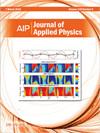受载流子掺杂控制的 Janus NbSSe 单层电子结构和磁性能
IF 2.5
3区 物理与天体物理
Q2 PHYSICS, APPLIED
引用次数: 0
摘要
二维自旋电子学因其在操纵电子自旋方面的优势和潜力而成为近年来的热门话题。本文采用第一原理和蒙特卡罗方法计算了 Janus NbSSe 单层的电子结构和磁性能。研究表明,该材料的基态是铁磁性金属。在载流子掺杂下,它经历了从金属到半金属的二阶相变,实现了 100% 的自旋极化,并增强或减弱了铁磁耦合。磁晶各向异性能的值为 570.96 μeV,掺入适当浓度的空穴可将易磁化轴从平面内转变为平面外。由于面外镜像对称性被打破,我们研究了外电场作用下层中的电荷变化。由于外电场和内置电场的共同作用,该层表现出一种独特的电荷转移模式。当掺杂 4.01 × 1013 cm-2 (每原子 0.04 个空穴)浓度的空穴时,居里温度可达 350 K 左右,这表明通过调节载流子浓度可以合理控制材料的居里温度。根据磁滞回线计算出的矫顽力为 0.01 T,其磁滞损耗较低,表明其对外部磁场的响应能力较强。上述结果都表明,这种材料在自旋电子器件中具有应用潜力。本文章由计算机程序翻译,如有差异,请以英文原文为准。
Electronic structures and magnetic properties of Janus NbSSe monolayer controlled by carrier doping
Two-dimensional spintronics has become a hot topic in recent years due to its advantages and potential in manipulating electron spins. In this paper, the electronic structures and magnetic properties of the Janus NbSSe monolayer are calculated using first-principles and Monte Carlo methods. Our study shows that the ground state of the material is a ferromagnetic metal. Under carrier doping, it undergoes a second-order phase transition from metal to half-metal, achieving 100% spin polarization, and enhancing or weakening ferromagnetic coupling. The value of the magnetocrystalline anisotropy energy is 570.96 μeV, and doping with an appropriate concentration of holes can transform the easy magnetization axis from in-plane to out-of-plane. Since the out-of-plane mirror symmetry is broken, we study the charge changes in the layer under the action of an external electric field. Due to the combined action of the external electric field and the built-in electric field, the layer exhibits a unique charge transfer mode. It is predicted that the Curie temperature of the material is about 156 K. When doped with 4.01 × 1013 cm−2 (0.04 holes per atom) concentration holes, the Curie temperature can reach about 350 K, indicating that the Curie temperature of the material can be reasonably controlled by regulating the carrier concentration. The coercive force calculated from the hysteresis loop is 0.01 T, and its hysteresis loss is low, showing its response to the external magnetic field. All of the above results indicate the application potential of this material in spin-electronic devices.
求助全文
通过发布文献求助,成功后即可免费获取论文全文。
去求助
来源期刊

Journal of Applied Physics
物理-物理:应用
CiteScore
5.40
自引率
9.40%
发文量
1534
审稿时长
2.3 months
期刊介绍:
The Journal of Applied Physics (JAP) is an influential international journal publishing significant new experimental and theoretical results of applied physics research.
Topics covered in JAP are diverse and reflect the most current applied physics research, including:
Dielectrics, ferroelectrics, and multiferroics-
Electrical discharges, plasmas, and plasma-surface interactions-
Emerging, interdisciplinary, and other fields of applied physics-
Magnetism, spintronics, and superconductivity-
Organic-Inorganic systems, including organic electronics-
Photonics, plasmonics, photovoltaics, lasers, optical materials, and phenomena-
Physics of devices and sensors-
Physics of materials, including electrical, thermal, mechanical and other properties-
Physics of matter under extreme conditions-
Physics of nanoscale and low-dimensional systems, including atomic and quantum phenomena-
Physics of semiconductors-
Soft matter, fluids, and biophysics-
Thin films, interfaces, and surfaces
 求助内容:
求助内容: 应助结果提醒方式:
应助结果提醒方式:


